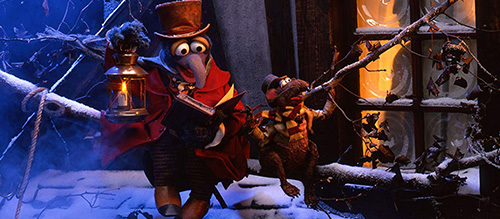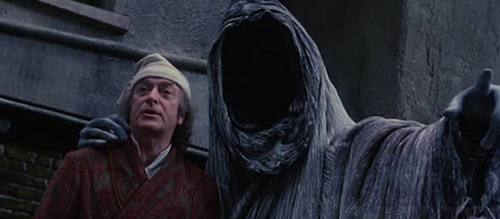Why ‘The Muppet Christmas Carol’ Has Become Hard To Watch
I would say that I watch The Muppet Christmas Carol every year. It came out in 1992, the year after I was born, so I can confidently claim that this is a film that I have watched throughout my life. It has always brought me great comfort and joy, with the charm of the Muppets and the story of a greedy awful man redeeming himself. To me The Muppet Christmas Carol is Christmas. However, the political events of 2019 have given me a very different view of this story.
To begin on a positive note, my favourite element of this adaption is the way in which it is framed – the Great Gonzo is playing Charles Dickens; he and Rizzo the Rat take us through the story, not only telling us what happens but making things happen (Gonzo tells us that Scrooge will come around the corner, and there he is). This is played with the Muppets’ signature all-knowing wink. Rizzo and Gonzo give great comic relief that is needed when watching this in a year such as ours. A particular favourite moment of mine is Rizzo climbing a fence to get to Scrooge’s house when he can fit through the bars. Gonzo and Rizzo provide us with information without it being condescending, giving context to the story: ‘Charles Dickens was a 19th century novelist, a genius’. Gonzo also tells us all to go read the book at the end. How many other movies bother to do that?
Here’s what is hard to watch in 2019…
The things that Scrooge do to make him mean are not awful 19th century deeds, but universally selfish and cruel things. We are told (through a helpful song) that ‘Old scrooge he loves his money because he thinks it gives him power’. This brings to mind a lot of people in our current society, not least prominent public figures and owners of multi-billion dollar corporations. One example of his evilness is that ‘He charges folks a fortune for his dark and drafty houses’. This shouldn’t be as relevant as it is today. I should be able to say “aren’t things so much better now? Thank God this is the past”. Alas, it is not, and there are people like Scrooge living today; people who benefit from the suffering of others.
Scrooge has no heart for charity, no kindness at all. His taxes pay for prisons and workhouses so the poor, in his eyes at least, should just go there. He has no sympathy for those who cannot pay their mortgages due to medical bills (thank god for the NHS – a staple of the UK that we at least have for now). Scrooge suggests that people are wasting their mortgage money on ‘frivolities’ which rings painfully true of some people’s attitudes today. Poor people are seen as criminal or ‘idle’. Scrooge does not even want his workers to be warm, which does lead to my favourite joke: the bookkeeping rats singing ‘This is my island in the sun’. Suffer in silence, be glad for what you have!
Now of course, the film is not all doom and gloom. Kermit (As Bob) attempts to bring some joy with ‘only one more sleep till Christmas’ after acting as union leader and getting his colleagues the day off. This scene is lovely, and I have to take a moment to appreciate the puppetry. Also, the joy of watching rats trying close blinds is enough to light up any dreary mid-winter evening.
We then get to the meat of the story.
Scrooge is visited by his old friends Marley and Marley who tell him that he will be visited by three ghosts of Christmas to help him see the errors of his mean ways.
The first ghost is the ghost of Christmas past, who is very creepy. We see Scrooge’s past and learn that he was a bit of a loner as kid, but as I am mad at him because of how he treats people in the present, I refuse to feel sorry for him just because he was a lonely little boy – why are so many evil men offered redemption through “tragic” backstories? Maybe don’t just sit and do extra homework – you might make some friends and learn some compassion and empathy. We are told that Scrooge is the ‘finest financial mind in the country’ by Sam the Eagle, then we learn that he isn’t making enough money to marry his sweetheart – so which is it? Scrooge asks the ghost ‘Why do you delight in torturing me?’ and all I can think is: because you are evil mate!
This is where we are exposed to “When Love is Gone”, which is a Michael Caine performed love song to the one that got away. This did not appear in the original theatrical release but was in the 1993 VHS version of my childhood. If you haven’t seen the version with this song in (ie, if you are not old like me) make sure to check it out.
Now, here is where the fun starts. The Ghost of Christmas present is a fun guy and I want him in my life. He shows Scrooge the family party that he refuses to go to every year. I also don’t feel sorry for him when his family are mean about him, and I really did when I was little because I love Micheal Caine, but; you know what Scrooge? You deserve people to think you are an ‘unwanted animal’.
We then visit the Cratchit household, which is a place of wonder. Bob (portrayed by Kermit) and his wife Emily (portrayed by Miss Piggy) bring the beloved Kermit and Piggy dynamic to the classic tale. The family drink to Scrooge as the founder of the feast (though Scrooge has just pointed out how said feast is very small). Miss Piggy is the voice of reason (me) here and is super sassy about how horrible Scrooge is and we should not settle for the little that he gives.
Tiny Tim is the character we should all hope to be, because he is grateful for have what he has, which is nothing. He sings a lovely song about being graceful, which of course makes Scrooge feel very bad. This feels very much like thanksgiving, or at least how I imagine thanksgiving to be because a British Christmas is much more drunk and angry.
Scrooge is then visited by the ghost of Christmas future. Scrooge is now starting to understand the error of his ways, that he has the power to change lives, particularly that of Tiny Tim. He realises: ‘A life can be made right’… I’m looking at you Boris – you too can change your future by being a better person. Scrooge wakes up, realises it’s Christmas and decides to buy the biggest Christmas turkey for the Cratchits. Scrooge promises to share the wealth, giving Bob a pay rise and giving money to charity. Everything is wonderful because Scrooge is living his life in pursuit of helping others, and everyone is happy!
Having seen the Christmas classic It’s A Wonderful Life in the interim of my most recent rewatches of The Muppet Christmas Carol, I did not get hit with the same emotional punch from this puppeted adaptation as I thought I would. Maybe it’s because I’m cynical and refuse to believe that Scrooge will change; but then maybe I only think that because people like him still exist over 100 years later? In all honesty, 2019 is probably the wrong year for any adaptation of “A Christmas Carol”, especially when not even the great Kermit the Frog can lighten the darkness enveloping our society.




You’re finally seeing it with adult eyes. Scrooge himself is immaterial. It’s a cautionary tale.